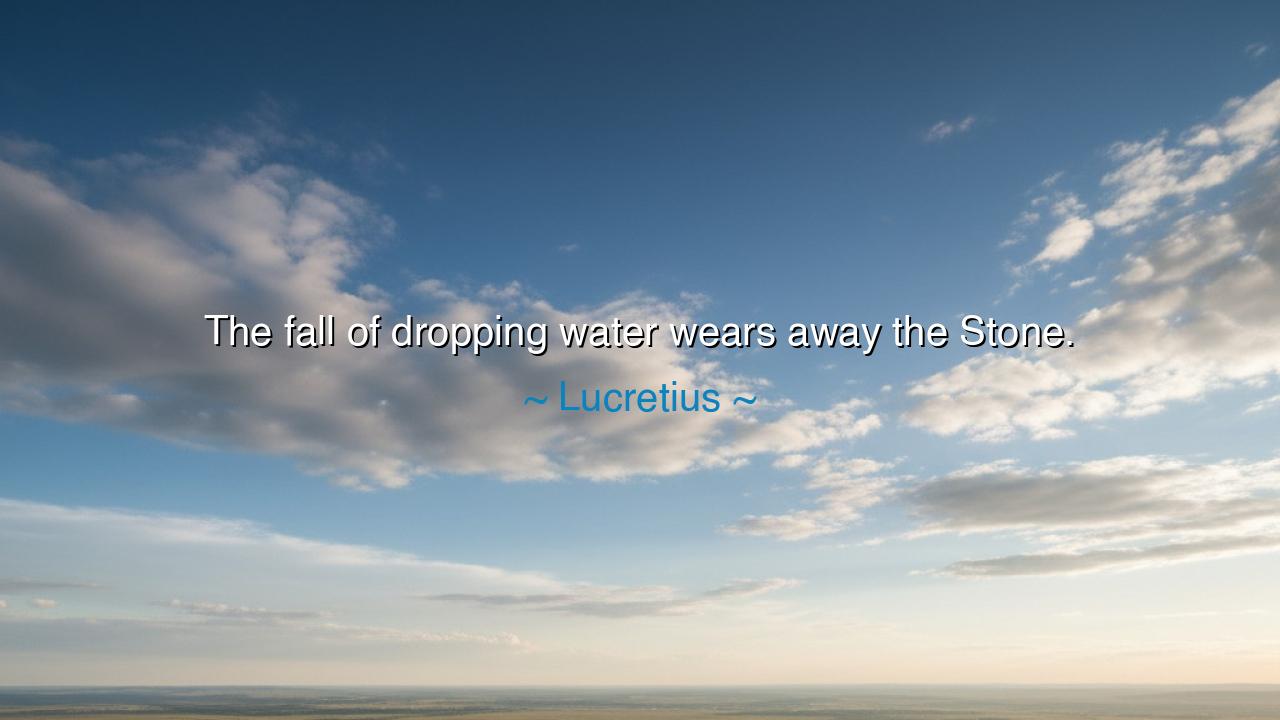
The fall of dropping water wears away the Stone.






Persistence is the quiet, unseen force that shapes even the mightiest of obstacles. When Lucretius, the ancient Roman philosopher and poet, declared, “The fall of dropping water wears away the Stone,” he revealed a timeless truth about the power of patience and steady effort. A single drop of water may seem weak and insignificant, yet through countless falls, it carves valleys and hollows stones. Likewise, the small, consistent actions of a person, repeated through the seasons of life, can overcome challenges that once seemed immovable.
At the heart of this teaching lies the contrast between softness and strength, time and endurance. The Stone represents the rigid barriers we face—be they oppressive rulers, crushing adversity, or our own inner fears. The water, though gentle, is unyielding in its rhythm. It does not strike with force but with consistency, proving that true power is not always loud or violent. Lucretius reminds us that great change often comes not through sudden upheaval but through the quiet, persistent shaping of time.
History offers many living examples of this truth. Consider Mahatma Gandhi, who faced the seemingly unbreakable stone of British imperial rule in India. Through decades of peaceful protest and unwavering resolve, he wore down an empire without lifting a sword. Each march, each fast, each act of nonviolence was a drop of water, slowly dissolving the foundations of oppression until independence was won. His life is a testament to the power of patient persistence against the hardest of stones.
On a personal level, this wisdom speaks to the struggles of the human soul. Many are daunted by the vastness of their goals—whether mastering a craft, healing a broken heart, or overcoming inner darkness. Yet Lucretius teaches that progress is not measured by sudden leaps but by steady steps. Just as the water does not despair when the stone remains whole after a thousand drops, we too must persist, trusting that each effort brings us closer to transformation. Over time, even the hardest hearts can be softened, even the deepest wounds healed.
Conversely, this saying also serves as a warning. Just as water can wear down stone through patience, so too can harmful habits, left unchecked, slowly destroy character and community. A single act of dishonesty or neglect may seem small, but repeated daily, it hollows out the strongest foundations. Thus, Lucretius urges us to be mindful of the forces we allow to flow through our lives, for they will shape us, whether we notice or not.
Let this lesson echo through the ages: gentleness and persistence triumph where force alone fails. As Lucretius teaches, the world is not changed only by heroes wielding swords, but by those who, like water, remain faithful to their purpose day after day. Be patient, be steadfast, and trust in the quiet power of time, for even the hardest stone cannot resist the eternal fall of the drops.






HTHa Thai
I love how this quote reflects the power of persistence, but it also makes me think: what if the stone doesn’t get worn away? What if it takes more than just time and consistent effort? Is there a point when perseverance stops being a strength and starts being a form of stubbornness? How do we balance persistence with knowing when to let go or change course when the result seems out of reach?
HHhao huy
The idea that the gentle force of water can wear away stone is fascinating, but it also raises a question: does this apply to all situations in life? Can small, persistent efforts always lead to change, or are there times when a more forceful or direct action is necessary? I sometimes wonder if the slow approach might lead to frustration if the results aren’t immediately visible.
NTDiem Huong Nguyen Thi
I’ve always found this quote inspiring because it highlights the importance of patience and consistency. It makes me wonder though, does this mean that every challenge or obstacle can eventually be overcome, no matter how big or daunting it seems? Or are there limits to how much persistent effort can truly change something? How do we know when persistence is the right approach and when it’s better to step back?
ATPhan Anh Thu
This quote makes me think about persistence and the quiet power of small actions over time. It's amazing how something as simple as water, which seems so gentle, can slowly wear away something as solid as stone. I wonder how this applies to personal growth or even social change. Is it the little, consistent efforts that really create long-term transformation, rather than big, dramatic actions?